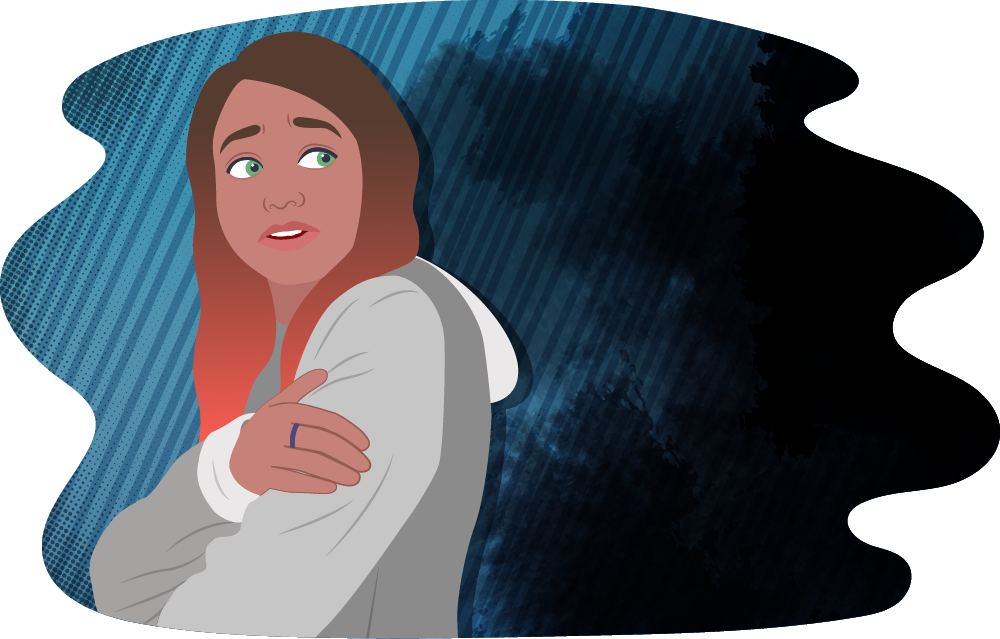Why does abuse happen?
You have a right to be safe. Abusive family relationships are complicated. ...
READ MEYou have a right to be safe. In an unsafe environment like an abusive home, your safety is the most important thing. Here’s a guide to staying safe when leaving isn’t an option.
Content Warning: this article contains violence and trauma related content that may be triggering or distressing.

If you find yourself in a situation where leaving home or accessing supports is difficult, such as during a pandemic lockdown or a natural disaster, it's important to focus on your short-term safety by:
Minimising contact with unsafe people
Maintaining contact with safe people
Creating a sense of safety
Having a safety plan (for if conflict occurs)
Find a place at home where you can isolate or have some space.
If you can’t physically remove yourself, find ways to mentally distance yourself safely or avoid interacting with the abusive person/people in your home, e.g. put in headphones, focus on reading a book.
Safe people can sometimes support you practically, e.g. giving you a safe place to stay if you need it, or emotionally, by being there to support you.
Because abuse is also psychological, connecting with people who like you for who you are as a person is also important for your self-worth.
You can also contact support services online/by phone, e.g. Kids Helpline.
It might help to learn some more about how your brain works when you’re stressed or anxious. Check out these articles:
Need help with safety planning? Want to report instances of abuse to keep a record?
You can talk to a Kids Helpline counsellor confidentially and anonymously.
Changes in appetite and sleep patterns
Body clues such as pounding heart, shortness of breath, upset stomach, headaches
Feeling like you are ‘walking on eggshells’ and deliberately changing your behaviours to avoid ‘setting them off’
Feeling bad about yourself or blaming yourself (can be a sign of psychological abuse)
Increased fear or disassociation (feeling ‘disconnected’, ‘surreal’, or like you are ‘in a dream’ when abuse occurs)
“You aren’t responsible for someone else’s behaviours. The sole responsibility for violent behaviour rests on the person doing the abuse, not on the people experiencing the abuse.” – Amanda, Kids Helpline Counsellor
You also know your family dynamic best. If you have found any strategies that work for you and your family, it’s important to use them.
If you are in immediate danger, or at significant risk of harm, call emergency services on 000.
Going outside or to a safe room that has more than one accessible exit
Distract the person abusing or redirect their attention, e.g. “I heard a knock at the door.”
Practice a quick excuse to leave, e.g. “Hang on, I was just on the phone and haven’t hung up yet. I better go do that now.”
If you pack a safety bag, make sure it is somewhere they could never accidentally find it, e.g. at a friend's house
Have a bag packed with important documents, money, spare keys and clothing in case you need to leave quickly
Give safe people support instructions in advance and have a plan to activate this, e.g. ask a neighbour to call the police if they hear yelling, organise a code word with a friend to call for help
When it comes to violence, they can also choose to harm in ways that aren’t easily visible and don’t always leave marks.
Abuse thrives on secrecy. In fact, people who abuse deliberately target people who they think are more likely to keep the abuse secret. Asking for support and not knowing what comes next can be frightening. But abuse rarely resolves without intervention, as people who abuse want it to be kept secret so they can keep abusing.
If you are experiencing violence or abuse at home, please tell a trustworthy adult (an adult who knows what to do to stay safe, like a school counsellor or a police officer) about what’s going on. Tell more than one trustworthy adult and keep talking to them until well and truly after the abuse has stopped.
You can also talk to Kids Helpline (anonymously if you choose) about your options.
Safety, care, kindness, love and respect are universal human rights. This means that they belong to everybody, without conditions. You don’t just deserve these things – you also have a right to them.
Having self-worth doesn’t mean feeling good about yourself all the time. It is about being realistic and reasonable, and being kind to yourself (rather than judging yourself harshly). Here are some things that may help:
Why does abuse happen?
You have a right to be safe. Abusive family relationships are complicated. ...
READ MEWhat is abuse
Abuse takes many forms and there isn’t one single way that ...
READ MEPhysical violence and abuse
Violence is never okay. If you or someone you know is experiencing ...
READ MEHow to ask for help
Sometimes we need help but we're not able to ask for it. ...
READ METalking helps! We’re here for you.
No problem is too big or too small.
We're here 24 hours a day, 7 days a week